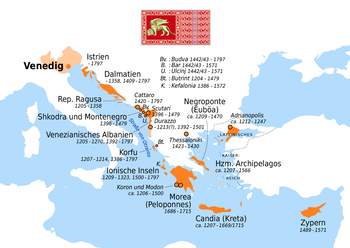# 9
History of the Balkans
Republic of Venice
Venice seized a number of locations on the eastern shores of the Adriatic sea before 1200, partly for purely commercial reasons, but also because pirates based there were a menace to its trade. The Doge since that time bore the titles of Duke of Dalmatia and Duke of Istria.
In building its maritime commercial empire, the Republic dominated the trade in salt, acquired control of most of the islands in the Aegean, including Cyprus and Crete, and became a major "power" in the Near East and in all the Balkans.
Venice became a fully imperial power following the Venetian-financed Fourth Crusade, which in 1203 captured and in 1204 sacked Constantinople and established the Latin Empire. Venice subsequently carved out a sphere of influence in the Aegean known as the Duchy of the Archipelago, and also gained control of the island of Crete.
From the 14th century, Venice controlled most of the maritime commerce of the Balkans with important colonial possessions on the Adriatic and Aegean coasts.
Venice's long decline started in the 15th century, when it first made an unsuccessful attempt to hold Thessalonica against the Ottomans (1423–1430). She also sent ships to help defend Constantinople against the besieging Turks (1453). After the city fell to Sultan Mehmet II, he declared war on Venice. The war lasted thirty years and cost Venice many of the eastern Mediterranean possessions.
Slowly the Republic of Venice lost nearly all possessions in the Balkans, maintaining in the 18th century only the Adriatic areas of Istria, Dalmatia and Albania Veneta. The Venetian island of Corfu was the only area of Greece never occupied by the Turks.
In 1797 Napoleon conquered Venice and caused the end of the Republic of Venice in the Balkans.

No comments:
Post a Comment